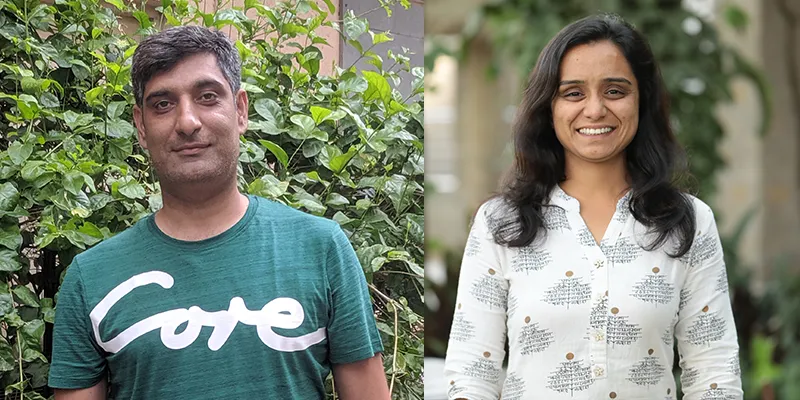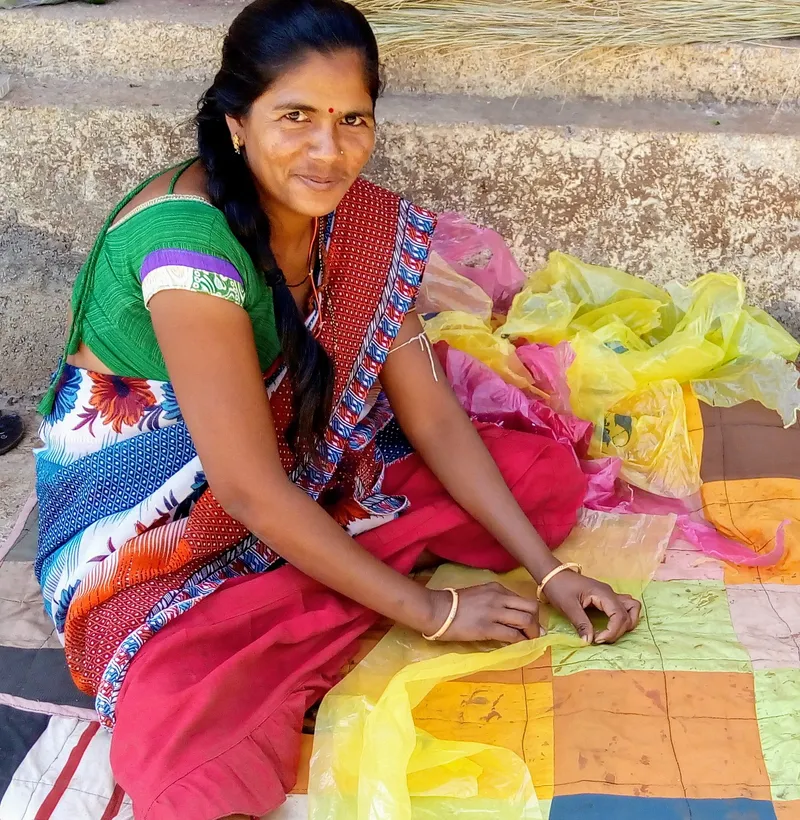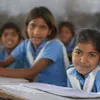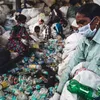These former IT professionals are turning plastic waste into fashionable home decor and bags
Pune-based Aarohana Ecosocial, founded in 2013 by Amita Deshpande and Nandan Bhat, is attempting to solve India’s plastic waste problem while providing steady livelihoods to tribal villagers.

Aarohana Ecosocial founders - Nandan Bhat and Amita Deshpande
Everything has value - even plastic. Over 60 percent of India’s plastic waste goes for recycling, according to the Central Pollution Control Board. Across the country, high-value plastic waste such as shampoo bottles and PET water bottles are collected by rag pickers and sold to recycling companies for a tidy sum. The problem remains in the form of smaller plastics - thin carry bags and wrappers - often left to accumulate on roadsides, in landfills and garbage dumps, as they are perceived as not worth the effort.
To address this problem, Pune-based Aarohana Ecosocial is turning plastic waste management into an art form by upcycling non-biodegradable and non-recyclable plastic into fabric. The company’s artisans and workers spin the plastic fabric using handlooms and traditional charkhas and make handbags, accessories, and home decor products. Most importantly, Aarohana’s project provides jobs and a steady income to over 30 tribal women and youths.
‘Aarohana’ refers to the ascending scale in Indian classical music, referring to the social enterprise’s desire to be an instrument to “ascend” or rise in sustainable development. It was founded in 2013 by former IT professionals Amita Deshpande and Nandan Bhat.
Leaving the corporate life behind
Amita and Nandan met as a part of a trekking group to Harishchandragad, a hill fort in the Western Ghats (Maharashtra). The nature lovers were shocked and disturbed by the number of plastic bags dotting the country’s once-pristine mountain trails creating a tremendous eyesore and causing great damage to the plant and animal life there.
Before deciding to become agents of change, Nandan was working at Sony, while Amita was with KPIT Cummins. It was during her time there that Amita realised that she truly wanted to do environment-related work. She quit her job to take a course in sustainability from Purdue University. Soon after, she reconnected with Nandan, and the two started Aarohana Ecosocial.
Aarohana did not start off weaving plastic. In fact, for the first two years, the duo travelled around India, learning about the value of different forms of plastic. They also saw that people in rural India were lacking employment options outside agriculture, compared with the number of odd jobs mushrooming in cities and towns.
Plastic products

A tribal villager, part of Aarohana Ecosocial's project
The co-founders decided to make two points their focus when setting up Aarohana’s plastic weaving in 2015. Unlike most companies, Aarohana takes pride in their manual labour and lack of technology and automation in manufacturing. The founders went to rural areas, and taught villagers the art of handweaving - an impressive feat, considering it is a craft that usually takes years of experience to master.
“Weaving fabric is so much easier than weaving plastic where everything has to be done manually and takes time,” Amita says.
One of their units is in the Western India union territory of Dadra and Nagar Haveli where Amita is from. The duo set up a weaving unit in a tribal village there, employing about 13 people. The employees, mostly tribal women, live next door to the facility, which is located in a lush mango orchard. They’re all paid between Rs 6,000 and Rs 15,000 a month - a fixed amount that isn’t tied to the amount of work they do.
“We are in a remote village that lacks access to alternate sources of livelihood. The locals depend only on monsoon-fed farming and can take only one crop each year due to their small landholding and lack of irrigation,” says Nandan.
The social enterprise has tied up with NGOs who collect waste to source its bags. Waste plastic bags are first cleaned and sundried. These are then manually cut into strips and rolled on a traditional charkha. Aarohana’s unique designs are also dependent on whatever waste is available.
Finally, a handloom is used to weave the plastic yarn into cloth. Once the plastic is spun and woven, it is sent to its Pune workshop, where product design and production happens. The cloth is stitched into various items including totes, cushion covers, and table mats. About 50 small plastic carry bags go into one Aarohana beach bag, and the founders estimate they have salvaged over 776,500 bags since August 2015.
The bulk of their sales comes from retail as well as exhibitions. Aarohana has received numerous corporate orders from companies such as TEDEx Kuwait and L'Oréal. In 2018, it sold about 10,000 products.

Some of Aarohana's products include file covers, home decor products, totes and yoga mat cases
Currently bootstrapped, Aarohana made sales worth Rs 14 lakh in its first year, and is netting Rs 51 lakh a year. It expects to double its sales in 2019, helped by international expansion plans and yet, has never taken any donations or investments.
Aarohana defines itself as a social enterprise - taking in donations would have subjected it to NGO rules on sales, while looking for investments is tough when returns aren’t as attractive as for-profit companies.
“We come from a corporate background, and we knew if we created a good product, the market would support it,” Nandan notes.
Future plans
Aarohana plans to expand to another tribal village closer to Pune. The founders expect to set up base there towards the end of the year. The village will have a visitor centre for those interested to see how it works, and the social enterprise plans to organise associated workshops and events as well.
Amita and Nandan are constantly in the market for new ideas and products for their plastic fabric, and recently launched home decor items. Aarohana is a regular on the exhibition and farmer market circuit. However, even during exhibitions, Amita and Nandan encourage buyers to not use plastic.
“Citizens need to have more awareness and the government needs to be stricter,” Amita emphasises.
India’s biggest problem with plastic also involves the lack of a segregation system. For example, plastic that is contaminated with food waste cannot be used for upcycling. Aarohana believes the mantra around plastic should actually be “REfuse, REduce, REuse and REcycle”.
Amita, for one, believes that the only solution to the rising tide of plastic is to ban it, despite using plastic on Aarohana’s looms. She believes they will never run out of litter and bags for their creations. Even if the unthinkable happens, and India and Aarohana somehow run out of plastic, Amita is still unfazed.
“We have a lot of plastic to take care of. But if we can’t, we will use our looms for something else. We’ll be the happiest,” she signs off.


![[Startup Bharat] With 50,000 users and 100 tonnes of waste collected per month, this Bhopal-bas...](https://images.yourstory.com/cs/2/a9efa9c0-2dd9-11e9-adc5-2d913c55075e/kabadiwala11554990616603.png?fm=png&auto=format&h=100&w=100&crop=entropy&fit=crop)







